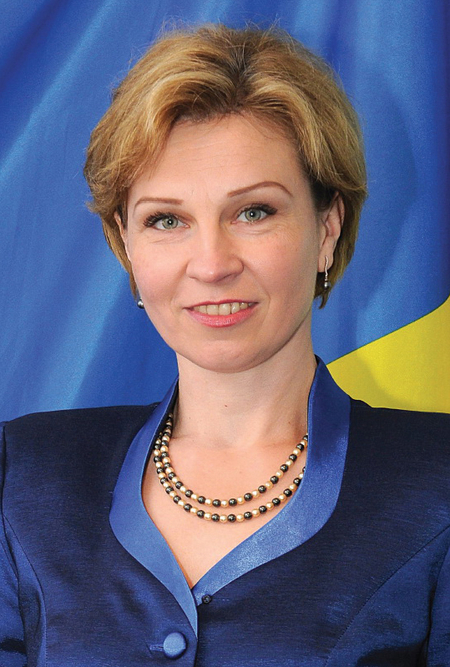The Hungarian government’s “unconstructive” step
Ambassador Liubov Nepop explained why Hungary promised to block the next session of the NATO-Ukraine Commission
Recently, head of the Hungarian Ministry of Foreign Affairs Peter Szijjarto made a high-profile statement during a press conference in Budapest. He said that Hungary was unable to support the European integration efforts of Ukraine, so his government had blocked the convening of a session of the NATO-Ukraine Commission (NUC) that had been scheduled for December, Radio Free Europe reports. He noted that the reason for such a decision was the Law “On Education” which had been enacted in Ukraine. According to him, till the beginning of September, that is, before the law was passed, the government of Hungary was “the most loud and most active” supporter of the event. At the same time, Szijjarto said that it was not possible to circumvent the Hungarian veto, since convening the NUC required a unanimous vote.
Meanwhile, as soon as the next day, NATO representatives made it known that the Alliance had not planned to hold a session of the NUC in December, and it was confirmed by own correspondents of Radio Liberty and UNIAN in Brussels.
“CONTINUING WITH NEGATIVE RHETORIC IS COUNTERPRODUCTIVE AND UNJUSTIFIED”
The Day asked Ambassador of Ukraine to Hungary Liubov NEPOP for clarifications on the position of Hungary and explanations why the neighboring country acted so strongly and disrupted a session of the NUC, not to mention the threats to Ukraine’s European integration, and why they did not accept the arguments that nowhere in the EU minorities were able to avoid learning the language of the country where they lived.
“The position of Hungary after the enactment of the Law of Ukraine ‘On Education’ was emotional and overly strong from the very beginning.
“As you know, other countries also had issues with the law, but as a result of bilateral consultations, we already have signed a declaration with Poland on ensuring the right of persons belonging to ethnic minorities to study their mother tongue and receive instruction in their mother tongue, an understanding was reached with the Bulgarian side, an explanation was provided to the Greek government, and consultations with Romania are conducted constructively. Having a positive experience of dialog with other countries, we proceed from the assumption that understanding is possible and necessary also with Hungary.
“To disperse the myths which are commonly believed in Hungary, Foreign Minister of Ukraine Pavlo Klimkin visited Budapest on October 12, while Minister of Human Resources of Hungary Zoltan Balog visited Kyiv on October 19. We explained in most minute detail the content of Article 7 and plans for its implementation, in order to demonstrate that the law in no way violated either the domestic or international obligations of Ukraine and did not create assimilation threats for the Hungarian community.
“Negotiations at the level of relevant ministers Lilia Hrynevych and Balog, which also involved head of the Ministry of Foreign Affairs of Ukraine Klimkin, left an encouraging impression and, as the Hungarian side noted as well, were held in a constructive atmosphere. The meeting showed the way to finding an agreement. That is why we cannot understand the reasons for Hungary’s return to the previous rhetoric and behavior after the visit.
“One can understand the Hungarian government’s aspirations to assist to the best of their ability the Hungarian community in Ukraine so that it is able to maintain its identity and to feel at home on its ancestral land in Ukraine. At the same time, in order to feel part of the nation, it is important to have proper knowledge of the national language. Knowledge of the mother tongue and preserving one’s ethnic identity in no way conflict with knowledge of the state language and the civic consciousness; on the contrary, both of these components must be integral parts of the formation of each citizen in any country. Let us not forget that the law aims to have Ukraine provide modern and equal opportunities for self-realization for its citizens in its territory, and, consequently, promotes the unity of our society and joint responsibility for the development of this country.
“It is difficult to understand the desire to block the European integration of Ukraine, which is in line with the interests of Hungarian-Ukrainian citizens as well.
“The statement on blocking the session of the NATO-Ukraine Commission, where our allies have an opportunity to hear about the development of security situation in the context of ongoing Russian aggression in eastern Ukraine and the occupation of Crimea, is difficult to explain at all. Our Hungarian-speaking compatriots also defend Ukraine and oppose the aggressor, so it is impossible to understand what such a step can do to protect their interests, and in general, to protect them, preserve their lives.
“During the visit of Minister Balog, we reached specific agreements on further interaction so that the implementation of the law would take into account as much as possible the special needs of the Hungarian community in Ukraine. In pursuance of the agreements reached, the Ukrainian side sent our Hungarian counterparts the draft protocol of the meeting, and we now expect an answer to it.
“Even if we continue to disagree, any unfounded speculations will go down with the publication of the recommendations of the Venice Commission, it being the most authoritative body whose opinion should dot all the i’s and cross all the t’s.
“That is why we consider continuing with negative rhetoric and stoking further tensions around the law to be counterproductive and unjustified, and encourage Hungarian colleagues to move on to a constructive dialog, counting on support for this approach from our European and Euro-Atlantic partners as well.”
Newspaper output №:
№66, (2017)Section
Topic of the Day





